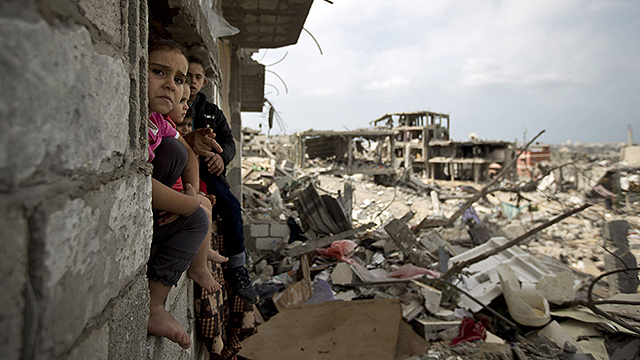
Cairo conference. 'Resumption of Israeli-Palestinian talks requires new ideas'
צילום: EPA
Gaza reconstruction has nothing to do with peace talks
Op-ed: Israeli-Palestinian negotiations reached a deadlock not because of Gaza or Hamas, but due to major gaps between the sides in regards to Judea and Samaria's future.
The conference dealing with ways to rebuild Gaza opened in Cairo this week. Many of the conference speakers, including Egyptian President Abdel Fattah al-Sisi and US Secretary of State John Kerry, want to leverage the gathering in favor of resuming the Israeli-Palestinian negotiations on the permanent agreement.

They are being joined enthusiastically by Israeli political officials, and there are even those who are urging an adoption of the Arab League initiative, based on Prime Minister Benjamin Netanyahu's vague statement at the United Nations.
As usual, this has created unnecessary confusion. There is a need for a clear distinction between three different issues: The reconstruction of Gaza, the resumption of Israeli-Palestinian negotiations and the Arab initiative.
What is the right policy on Gaza? Israel has no territorial, economic or political interest in Gaza. The Palestinian Authority's status in Gaza is an internal Palestinian or an internal Arab or an international issue, but not an Israeli issue. In regards to Gaza we only have security-related interests, and there are two of them: A sustainable calm, and damaging Hamas' ability to restore its military capabilities.
Therefore, regardless of our absence from the Cairo conference, Israel should show some generosity and agree to expand its economic activity with Gaza, including in terms of electricity, gas and (desalinated) water supplies.
Moreover, Israel can agree that a seaport will be built in Gaza in the second stage, but that its construction must depend on the creation of a reliable mechanism for demilitarizing the Strip. It will take years to build a port, its construction will burden Hamas' future desire to fire at Israel and put such an expensive project at risk, and above all – the actual existence of a port is not dangerous. The level of risk is determined by the maritime regime, and that can be agreed on as part of a package deal.

Destruction in Gaza Strip. 'Israel should treat Gaza as a separate issue and generously agree to any request, as long as it does not contradict our security interests' (Photo: AFP) (צילום: AFP )
The Gaza reconstruction issue has nothing to do with the Israeli-Palestinian negotiations, which reached a deadlock half a year ago, even before the abduction of the three teens and Operation Protective Edge. It reached a deadlock not because of Gaza or Hamas, but due to major gaps between the two sides in regards to the future of Judea and Samaria.
I don't understand why some people think that an arrangement in Gaza depends on the resumption of the negotiations, and I don't understand how we will be able to suddenly reach a "two-state" solution based on an outline which has been failing for 20 years now.
This brings us to the third issue: The 2002 Arab initiative. According to this initiative, all Arab states will recognize Israel after (only after!) it returns to the 1967 borders. For those of us who don't understand, this does not only mean a full withdrawal from Judea and Samaria, but also a full withdrawal from the Golan Heights.
Does anyone think that Israel can agree today to a full withdrawal from the Golan Heights? Clearly, the Arab League initiative in its current outline is a non-starter for a serious dialogue with Israel.
This leads to two conclusions: One, we should treat Gaza as a separate issue and generously agree to any request, as long as it does not contradict our security interests. Two, resuming the Israeli-Palestinian negotiations – through a direct dialogue or as part of a regional arrangement – requires us to raise new ideas.
The idea to expand Gaza into Sinai, which was attributed to the Egyptian president, is definitely an interesting direction. On the other hand, returning to old, familiar concepts, including the Arab initiative, will be a waste of time.
Major-General (res.) Giora Eiland is a former head of Israel's National Security Council.










